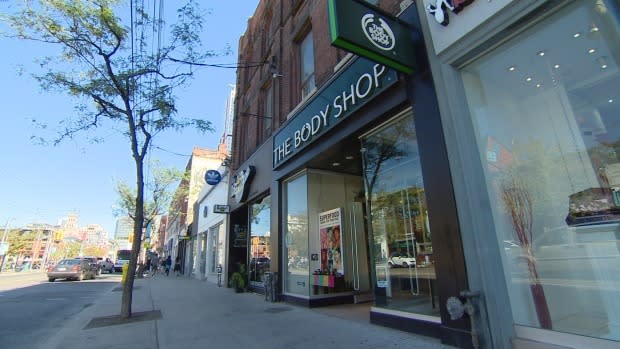Woman Refuses Job Interview Over ‘Full Face of Makeup’ Requirement

A woman who applied to work part time at the Body Shop to help cover her grad school costs is instead calling out the company for hypocrisy after she was instructed to wear a “full face of makeup” for her job interview at the store.
“We believe true beauty comes from the heart,” reads the mission statement of the Body Shop, founded in England in 1976 by Anita Roddick. “For us, beauty is much more than a pretty face. It’s about feeling good and doing good, too.”
Nevertheless, after Brenna MacPhee, 23, of Toronto, applied to work at the store, she received an email with the time and location of the interview, as well as this detail, according to CBC News: “***DRESSCODE: Please wear all black business attire and a full face of makeup as it is our dresscode in the store.”
MacPhee was so stunned, she decided to skip the appointment altogether and email the Body Shop on the matter. She shared her note in a Facebook post. “I chose not to come as I was deeply turned off by the prospect of working for your company… The fact that you require female interview candidates, not even employees, to ‘wear a full face of makeup’ is very problematic,” she wrote (sending it, unfortunately, to a do-not-reply-email address). “The implication behind such a requirement is that women look best with full makeup, and that it is a necessity. If I do not own makeup and cannot afford to invest time and money into the products you deem essential; if I choose not to wear makeup, or wear a lot, it should not have an impact upon my ability to work. After all, I was under the impression that I would be hired based upon my qualifications, not based upon my looks.”

Her Facebook post has been shared more than 175 times and has generated both critical and supportive commentary. “From someone who wears NO makeup (me!), I find this very upsetting!!” one person angrily shared. “They are saying I’m not fit to go outside unless I transform my face?? Since when is makeup an essential part of life?” Wrote another, “Remembering when Body Shop first opened in the U.K., it was all about natural products and cruelty free, Anita Roddick would probably turn in her grave hearing that.”
Another commenter offered a different view: “Pushing makeup on employees isn’t nice, however if you willingly apply to jobs, each place will have its own dress code. She chose to apply to a beauty store, of course the employees will have to wear their products to help sell them…Not saying it’s right, it’s just that’s a part of working sales.”

The Body Shop has not responded to a request for comment from Yahoo Beauty. But the Body Shop Canada’s vice president of marketing and corporate responsibility told CBC News that the company would investigate the situation. The company also tweeted these responses:
We are sorry to hear of Brenna’s experience. Our Customer Consultants are at the heart of The Body Shop. As brand ambassadors…(1)
— The Body Shop Canada (@TheBodyShopCA) September 20, 2016
…they need a passion for our products so they can speak about them enthusiastically and knowledgeably to our customers. (2)
— The Body Shop Canada (@TheBodyShopCA) September 20, 2016
Unfair as it may be, the Body Shop, at least in the U.S., may be well within its rights to require specific appearance codes for both interviewees and employees. “While it is not legal to have dress codes for only one sex but not the other, so far the law seems to allow different dress codes for women and men, as long as they do not put an unfair burden on one gender more than the other,” notes the “dress codes and grooming” section of the website for the nonprofit organization Workplace Fairness.
An organization spokesperson, Paula Brantner, tells Yahoo Beauty, “It’s probably not that different when [enforced] during an interview, as the law that is going to be applicable when you are working allows it. It’s a screening device. And there’s no real difference between what they can do in an interview and what they can do on the job.”
Even though a required full face of makeup does seem like a clear “unfair burden” on women compared with the standard male requirement to groom facial hair, Brantner cites several cases as unfortunate precedents to MacPhee’s experience with the Body Shop.
The clearest parallel is from a decade ago, when Harrah’s casino implemented a dress code requiring female bartenders to wear extensive makeup and styled hair. “They had this whole process where they did a makeover, then expected you to emulate that look every day,” Brantner says. Men, meanwhile, only had to maintain trimmed hair and nails. A beloved, longtime employee who protested the new rule, saying it “made her very uncomfortable,” wound up fighting it in court, and losing, with a ruling that the company had the right to invoke its “appearance standards.”
Just last week, an appeals court upheld an Alabama insurance company’s right to ban a woman from wearing dreadlocks at work, despite the racial and cultural implications as argued on behalf of the employee by the Equal Employment Opportunity Commission.
How are companies allowed to enforce such rules? “Throughout the U.S., we have employment-at-will, meaning a company can hire and fire for any reason, as long as it’s not illegal,” Brantner explains. “So the question is, what would make it illegal?” Obvious racism and discrimination based on sexual orientation are examples, as is clear gender bias — but proving it effectively in a court of law can be difficult. “Companies can require a professional appearance,” she says, “and they can define it differently for women and for men.”
Let’s keep in touch! Follow Yahoo Beauty on Facebook, Twitter, Instagram, and Pinterest.




